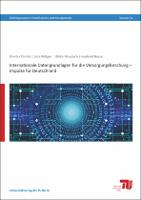Internationale Datengrundlagen für die Versorgungsforschung
Impulse für Deutschland
Author(s)
Panteli, Dimitra
Röttger, Julia
Nimptsch, Ulrike
Busse, Reinhard
Collection
AG UniversitätsverlageLanguage
GermanAbstract
The availability and accessibility of comprehensive, high-quality data are indispensable prerequisites for effective health services research. It can be assumed in the coming years that health services research will increasingly be based on data linkage, i.e. the linking of several data sources based on suitable common key variables. In Germany, comprehensive high-quality data are routinely collected, but their suitability and availability for research purposes is limited. Therefore, the motivation for this report lies in the answering of two basic questions: which questions of health services research can be better answered abroad on the basis of better data, and in which ways such conditions could be achieved in Germany. Case studies of interesting linkage approaches from twelve countries were identified and analyzed based on a predefined conceptual framework. Information on all comparison countries or case studies was first identified from publicly available sources. Profiles were then created for each country and case study and forwarded to appropriate country experts for validation and completion. The report presents an overview of the included case studies (chapter 3), as well as key information per country and case study in the appendix. This is followed by a closer look at the possibilities of using routine data (chapter 4), linkage approaches with and without unique personal identifiers (chapter 5), the different access routes for researchers (chapter 6), options for using data from electronic patient or health records for research (chapter 7), and an interim conclusion (chapter 8). The report ends with a wish list for possible regulatory changes in light of the current policy debate in Germany (Chapter 9). It is important to underline here that case studies from the international comparison were selected to highlight important aspects that could be relevant to the challenges in Germany. In addition to the added value of comparatively easily accessible, extensive claims data, which are available more quickly than in Germany, allow cross-sector analyses and can be linked to health data and regional data on a person-by-person basis, the potential of databases created on the basis of the routine documentation of service providers (usually electronic health records) is also discussed. Investing in this direction can not only provide insights for a country’s own healthcare system, but also promote international cooperation and contribute to the international visibility of scientific excellence. A juxtaposition of the data sets available in Germany and those used in other countries suggests that the discussion in Germany should focus first and foremost on optimizing the availability and accessibility of existing data and consider new approaches to the collection of additional information as a supplement.


 Download
Download Web Shop
Web Shop